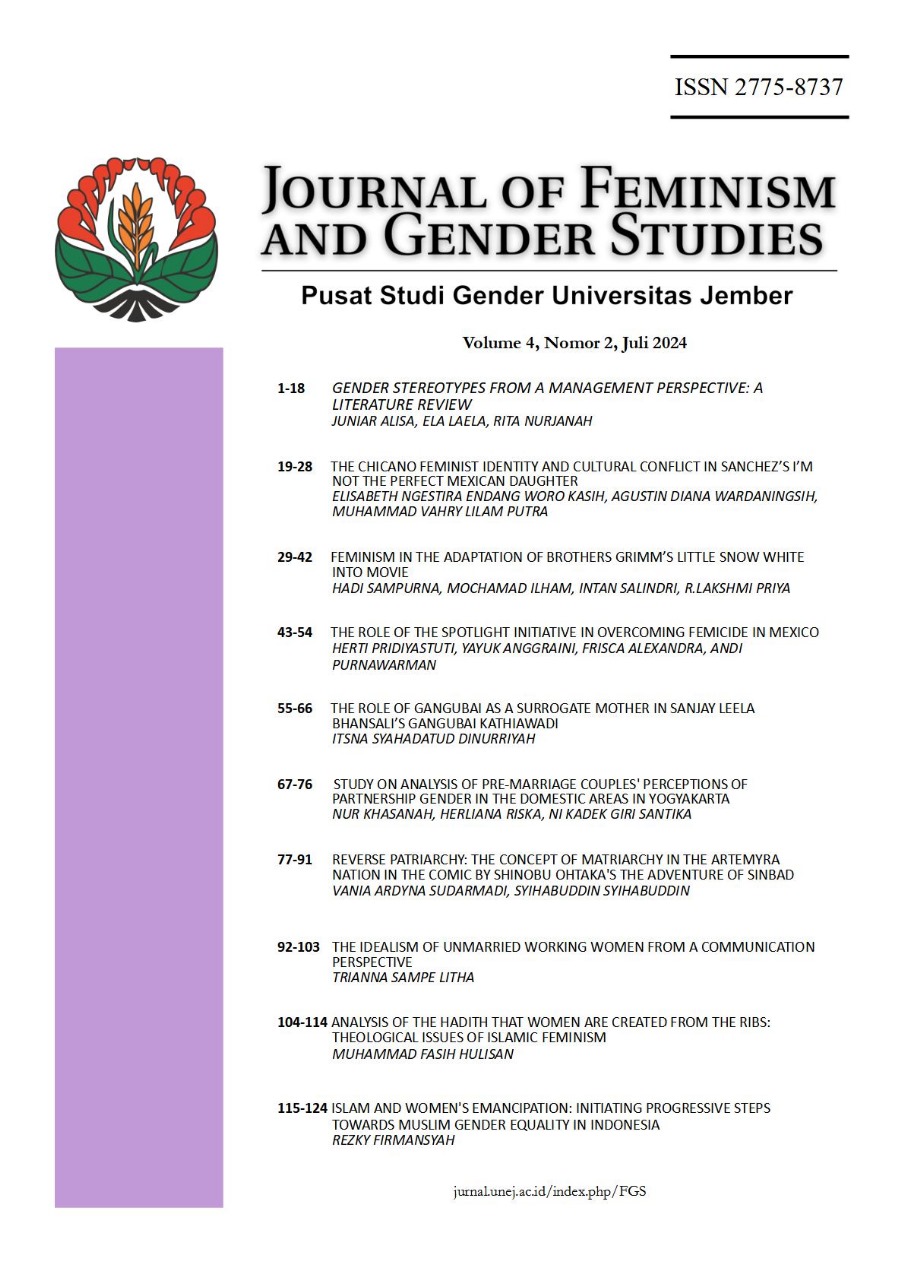The Idealism of Unmarried Working Women from a Communication Perpective
Indonesia
Abstract
The expectation that demands end when marriage will end for women is no longer commonplace. As time goes by, this choice is increasingly not realized, especially for women because they now strive for success in education and work rather than getting married. It is inevitable that stereotypes about unmarried women are increasingly being expressed, but that does not change their decision. The aim of this research is to understand and describe how working women who decide to be single or not marry communicate. In line with that, this research uses symbolic interaction theory and standpoint theory to explain the idealism of unmarried working women from a communication perspective. This research was conducted using a phenomenological method where interviews were conducted with several informants who were determined based on purposive sampling and snowball sampling techniques. From the research results, it was found that the idealism of women who choose to work rather than marry is entirely based on internal reasons for women who have rights to their own lives and choose not to marry. They said that there was no special and strong reason why women had to get married. Apart from that, getting married is not a priority in life and there is an unpreparedness to be in a long relationship. Apart from that, their quality of life is fine without their married status.
References
Anjar, L., Pratama, J., & Mujab Masykur, A. (2018). Interpretative Phenomenological Analysis Tentang Pengalaman Wanita Dewasa Madya yang Masih Melajang. 7(2), 351–352.
Fazira, A. A. (2023). MEMAHAMI NARASI KOMUNIKASI PENGAMBILAN KEPUTUSAN UNTUK TIDAK MENIKAH PADA PEREMPUAN. 19–20. https://eprints2.undip.ac.id/id/eprint/14330/2/BAB%201.pdf
Lase, F. J. (2020). Penggambaran Perempuan di Majalah Popular 1988-2018. Jurnal Ilmu Komunikasi, 17(1), 50. http://repository.uki.ac.id/4616/1/PenggambaranPerempuan.pdf
LittleJohn, S. W., Foss, K. A., & Oetzel, J. G. (2016). Theories of Human Communication (Eleventh Edition). Waveland Press,Inc.
Muharram, A. (2023). Pola Komunikasi Gigolo dalam Prostitusi Daring di X. Jurnal Representamen, 9(02), 94–96. https://doi.org/10.30996/representamen.v9i02.9634
Musahwi, M., Anika, M. Z., & Pitriyani, P. (2022). FENOMENA RESESI SEKS DI INDONESIA (Studi Gender Tren ‘Waithood’ Pada Perempuan Milenial). Equalita, 4(2), 205. https://www.syekhnurjati.ac.id/jurnal/index.php/equalita/article/view/12905/4987
Putri, R. A. S. (2021). Potret Stereotip Perempuan di Media Sosial. Jurnal Representamen, 7(02), 114–115. https://jurnal.untag-sby.ac.id/index.php/representamen/article/view/5736
Ramalia, N. F. (2023). POTRET KEHIDUPAN PERNIKAHAN ANAK DI BAWAH UMUR (Studi Kasus: Nagari Lubuk Gadang, Kecamatan Sangir, Kabupaten Solok-Selatan). [UNIVERSITAS ANDALAS]. http://scholar.unand.ac.id/211245/
Santika, E. F. (2023, January 3). Tren Pernikahan Anak Muda Semakin Turun 6 Tahun Terakhir. Databoks.Id. https://databoks.katadata.co.id/datapublish/2024/01/03/tren-pernikahan-anak-muda-semakin-turun-6-tahun-terakhir
Sumampouw, L., Patricia, M., & Zamaya, N. (2023). Analisis Komunitas Feminis Yogya (Gender Mahardika) yogyakarta. Jurnal Dinamika Sosial Budaya, 25(2), 160. https://doi.org/http://dx.doi.org/10.26623/jdsb.v25i3.7124
Tiara, P. P., & Lasnawati. (2022). MAKNA GAYA HIDUP SEHAT DALAM PERPEKTIF TEORI INTERAKSIONISME SIMBOLIK. JURNAL ILMIAH MULTI DISIPLIN INDONESIA, 1(11), 1630–1631. https://journal.ikopin.ac.id/index.php/humantech/article/view/2300/1931
Wijaya, A. (2018). Pola Komunikasi Perempuan Lajang Tipe Voluntary Stables Singles Membentuk Seseorang untuk Memiliki Keputusan untuk Tidak Menikah. UNIVERSITAS KRISTEN SATYA WACANA.
Wood, J. T., & Oraiz-Fixmer, N. (2017). Gendered Lives: Communication, Gender & Culture, Twelfth Edition (Twelft Edition). Cengage Learning.

This work is licensed under a Creative Commons Attribution-ShareAlike 4.0 International License.











